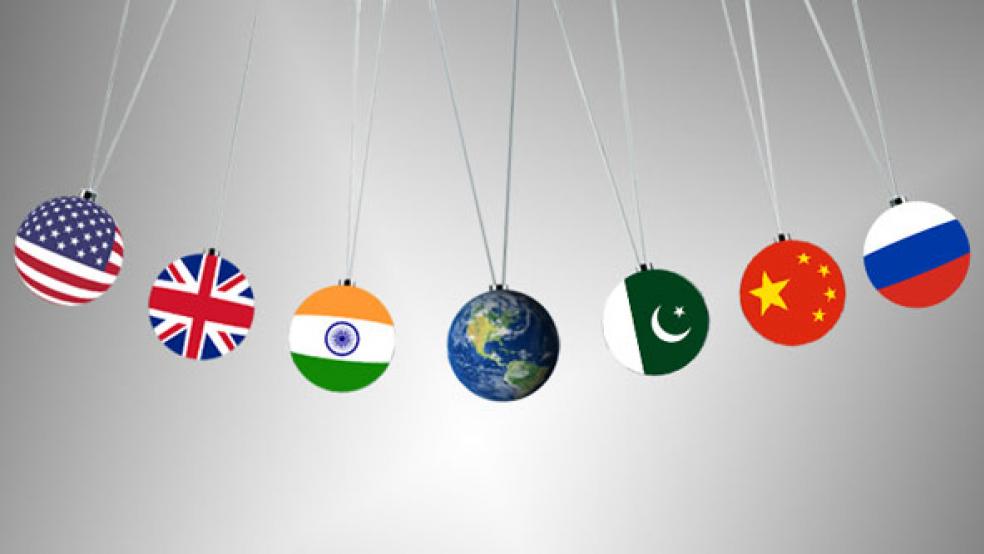
On its face, the whole Edward Snowden saga might seem like a debate about technology, privacy, and just how far the government can reach into the private lives of people and institutions around the world.
But look deeper. Snowden is a dissenter with a bag full of top-secret documents, visiting U.S. rivals like Russia and China in the hopes that they or one of their allies will grant his asylum. It’s a story of betrayal, shifting world power, and a secret, silent continuous war being fought in the shadows. It’s a story that could have taken place in the 1970s, with West Berlin standing in for Hawaii, the site of Snowden’s deceit, and East Berlin taking the place of Moscow, the city where he’s currently hiding.
It’s the first story of the 21st Century Cold War.
RELATED: CHINESE ATTACKS REVEAL UNDECLARED GLOBAL CYBER WAR
After the fall of the Berlin Wall and the victory of the west over communism, threats to American interests became feral. Non-state terror groups like al Qaeda lived off the land in Afghanistan, eventually growing strong enough to kill thousands of Americans.
But with the defeat of al Qaeda in Afghanistan, the threat of a spectacular terror attack conducted by a large, organized group are diminishing—at least for the near term. Now, terrorism will be the work of individuals loosely affiliated with the cause as opposed to a core group of fanatics. As the Boston Marathon shows, these kinds of terrorists can also be deadly and are harder to identify and stop.
THE REALIGNMENT
The lack of emphasis on organized terrorist threats is refocusing U.S. military strategy on rivals that are more familiar to history. In this case--China and Russia.
The Pentagon’s planned pivot toward Asia is an acknowledgement of this change. It’s a strategy designed to counter China’s growing influence in the region while attempting to win new allies in a part of the world the DOD has largely ignored since Vietnam.
RELATED: BRICS--THE COMING CHALLENGE TO US ECONOMIC DOMINANCE
Meanwhile, countries are lining up behind either the United States or China based on broad governing philosophies. Authoritarian powers like Pakistan have aligned with the Chinese and Russians. The United States maintains relationships with democracies like the United Kingdom and Germany, while courting emerging democracies like India, a nuclear power that happens to be right next to Pakistan, also a nuclear power.
At the same time, smaller countries are pledging loyalty based on political ideology and perceived benefit. Iran, North Korea and Syria have strong relationships with Russia and China, as they enable these countries to continue authoritarian rule. The same can be said of South American countries with authoritarian tendencies like Venezuela and Ecuador.
More democratic countries like South Korea, Japan, Singapore, Brazil and Argentina have joined the American alliance. Former Soviet republics like Georgia and Kazakhstan struggle to break free of Moscow and align themselves with the west.
The rest of the world is now up for grabs. The United States and China are quietly fighting for the loyalty of undecided countries that could swing the balance of world for decades. And right now, the countries that are likely to determine the outcome of the 21st Century Cold War are leaning east toward Beijing.
SNOWDEN HIGHLIGHTS ALLEGIANCES
Snowden’s actions highlight these allegiances, whether or not he intended them to. He joined the NSA with the sole purpose of stealing and exposing American secrets. He then fled to Hong Kong, which has independent governors but ultimately answers to Beijing.
The United States asked Hong Kong authorities to arrest Snowden but they declined, dismissing Washington’s request. Snowden, sensing the heat, then took off for Moscow, with plans to travel to Ecuador via Cuba.
What does each of the countries in Snowden’s misadventure have in common? They’re either quiet rivals or are downright hostile toward the United States.
RELATED: EDWARD SNOWDEN—FROM WHISTLEBLOWER TO TRAITOR
Snowden never would have attempted to seek asylum by traveling to the United Kingdom via Australia and Germany for the simple reason that each of these countries would have arrested him and sent him back to the United States. They would do this for a simple reason- they’re U.S. allies. All of the countries Snowden has visited or plans to visit are not.
This makes him the 21st Century Cold War’s Phillip Agee, a CIA defector who escaped to Cuba after he exposed the identity of undercover agents. The Cubans protected Agee from American law enforcement until his death in 2008.
WHY AFRICA IS THE BRASS RING
Right now, China and the United States are jousting for nations that have yet to declare an allegiance. For instance, China has been busy building relationships in the Middle East as the United States has withdrawn from the region.
But the real prize is Africa. The continent is rich with national resources, has enormous economic potential, and its location on the map makes it strategically indispensable.
China has made significant inroad in northern, primarily Muslim countries like Sudan and Egypt. The United States has traditionally had strong relationships with Christian-dominated countries like oil-rich Nigeria, Uganda and South Africa.
Much of the rest of Africa is still undecided. The bad news for Washington is that it’s leaning toward China due to lack of attention by the Obama administration and waning investment by American companies. China has been accused of imperialism, but as long as the governing classes are happy and rich, they will tolerate Chinese presence.
This makes Obama’s trip this week especially important. If the United States loses Africa, its resources and its people, this century’s Cold War might have a very different outcome than the last one.





